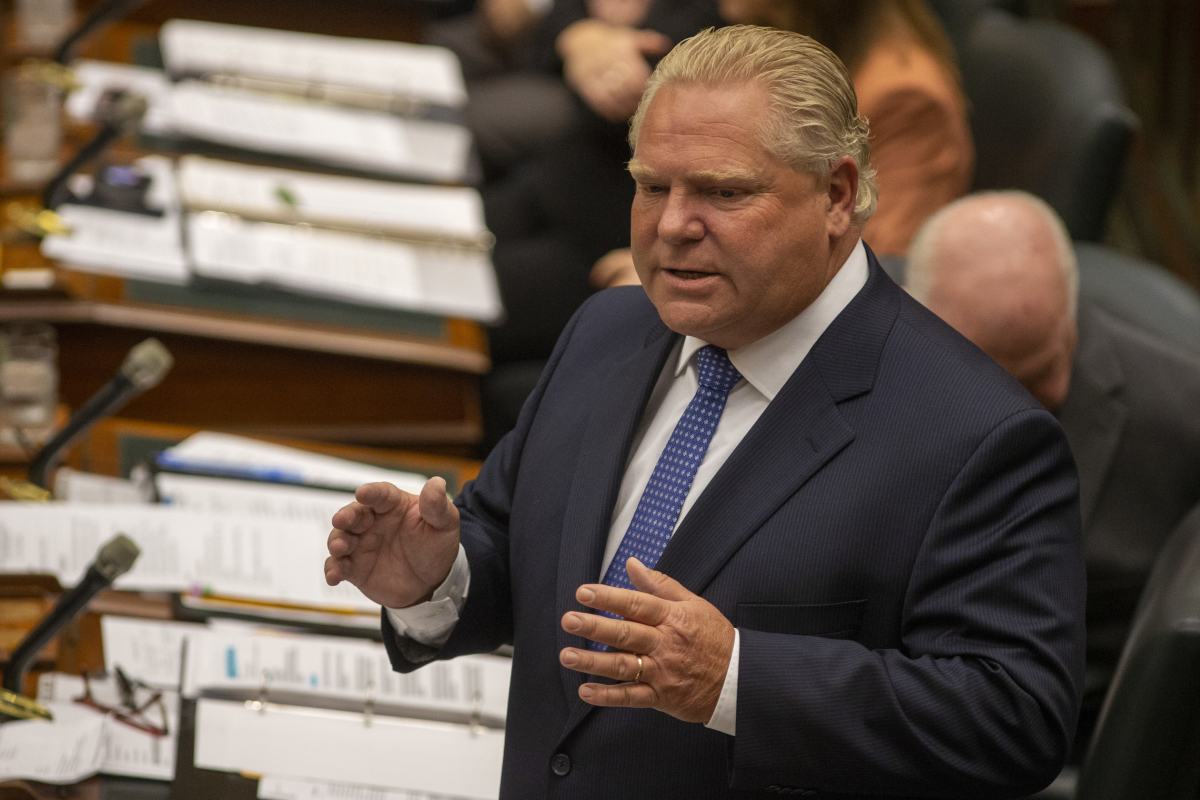Support strong Canadian climate journalism for 2025
An Ottawa-area energy cooperative has revived two of the 758 energy contracts that Ontario Premier Doug Ford cancelled days after taking office — contracts that will help two district schools become self-sustainable in energy production and consumption.
In October 2017, the Ottawa Renewable Energy Co-operative (OREC) — a 750-member organization that self-finances solar projects in eastern Ontario — and the Conseil des écoles catholiques du Centre-Est (CECCE) — the Ottawa-area French-Catholic district school board — had secured two feed-in-tariff contracts from the Independent Electricity System Operator — the crown corporation in charge of the province's electricity operations — to build solar projects for two schools.
The projects were a joint venture designed to feed all the energy produced into the Ontario grid, therefore earning revenue from the Ontario government for each kilowatt per hour produced.
They were to be located on the roofs of École Secondaire Catholique Paul-Desmarais and Collège Catholique Mer Bleue — high schools located 40-minutes drive apart on either side of Ottawa, in Stittsville and Orléans.
By the time Ford came into power, OREC and CECCE had spent $21,000 on each project, and electrical and structural design work was underway. They expect that money to be compensated by the IESO. Thornell said their security deposit has been returned, but their compensation application remains in progress five months after the projects were cancelled.
“We were obviously disappointed,” said Aaron Thornell, OREC’s communications manager. But, the energy cooperative had seen the writing on the wall when Ford’s anti-environment election campaign started gaining momentum and began looking into new approaches to continue investing in renewable energy without the government almost immediately.
“We were bracing ourselves for some of the contracts to be cancelled,” he said, adding that the government was within its rights to cancel the contracts. The cooperative had four with the government, to be built out over the next two to three years. All four were cancelled.
“We weren’t going to let the cancellation of these contracts get us down,” he said. “We started working on different ways to make it work and allow the project to go forward."

“We are now operating on a model where the energy is being produced and consumed on-site, with any excess energy then being sent to the grid for future use,” Thornell said in a phone interview. “Now the school can put the solar project on its roof and consume the electricity directly.”
This will help the school save money on their electricity bill, Thornell added.
The final verified compensation amounts for the 758 cancelled green energy projects are not yet available, an IESO spokesman told National Observer in an email statement. The operator "is currently receiving and verifying cost compensation submissions from affected former suppliers, and we expect to continue receiving and reviewing submissions throughout 2019," he said.
"The power from these projects is not currently needed for the reliability of Ontario's electricity system, so it has not been reallocated," the spokesperson added. The cancellation of these energy projects is estimated to save ratepayers about $790 million.
School board is losing $1 million in funding for 'ecologically-responsible initiatives'
The cancellation of the two solar projects have not greatly impacted the school board's efforts to reduce their carbon footprint. The Ontario Ministry of Education had allocated funds to school boards working to reduce greenhouse gas emissions through structural renovations and improvements. For CECCE, this added up to over $790,000 in funding in 2017-2018, which has been used in full to replace lighting with LED bulbs and refurbishing energy-intensive ventilation and heating systems.
The CECCE implemented its first solar panel project in 2011 through government funding, the school board said in an email statement to National Observer written in French. “The CECCE decided to pursue these types of projects since they are consistent with its vision of promoting sustainable development," it wrote.
“The measures adopted by the new government won’t have any impact on the solar panels already in place in the CECCE’s 18 schools,” it added.
The two IESO energy contracts that were cancelled were planned projects that will now proceed without the government, CECCE said in their statement, adding that they were committed to their partnership with OREC — which also aids in the maintenance of solar panels across its schools.
“Since the government no longer subsidizes work to reduce greenhouse gases, the CECCE must finance these initiatives through its own means and/or with private partners,” the statement said.
The loss of revenue from the cancelled solar project has made things “more difficult for the school board,” said the board. In 2017-2018, the solar panels generated about $315,000 in revenues. The CECCE has assessed that it will have lost about $1 million when it comes to “funding to encourage ecologically-responsible initiatives.”
The CECCE said that it remains fully-committed to making its buildings more efficient and less energy-intensive, but the Ford government’s cuts “restrict the means to implement initiatives aiming to reduce the ecological footprint of students and members of the CECCE’s personnel,” it said in the statement.
While the government's energy ministry has cut funding for 758 green energy contracts, the education ministry says it is committed to funding greenhouse gas reduction projects.
In an email statement to National Observer, Kayla Iafelice said and CECCE will receive over $790,000 for retrofits in the 2018-2019 school year.
"Our government will invest $95.4 million out of the $100 million dedicated to schools who submitted eligible contracts under the previous government’s Greenhouse Gas Reduction Fund," Iafelice wrote. "Consistent with our commitment to honour previously signed contracts, 100 per cent of Conseil des écoles catholiques du Centre-Est (CECCE) GGRF-eligible projects will be covered.”
CECCE said it "hopes that the Conservative government will implement new programs for school boards in the course of its mandate."
Editor's note: this story was edited on January 16, 2018 at 1:45 p.m. to accurately reflect the costs of the solar project and add a statement from the Ontario Ministry of Education.






Comments